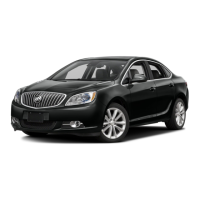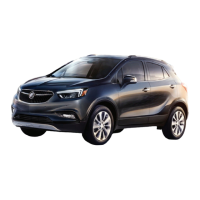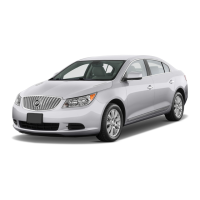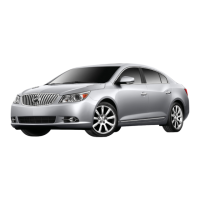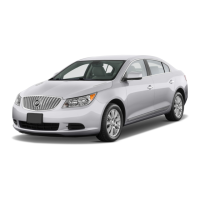Do you have a question about the Buick 2017 LaCrosse and is the answer not in the manual?
Guide on how to quickly locate information using the Index.
Explains hazard messages found on vehicle labels and in the manual.
Explains vehicle symbols used instead of text for operation or information.
Lists additional symbols found on the vehicle and their meanings.
Overview of the instrument panel and its components.
Explanation of the fuel-saving stop/start system that shuts off the engine at a complete stop.
Details on the RKE transmitter's operation and range.
Instructions on how to lock or unlock doors from inside and outside the vehicle.
Instructions for adjusting power seats, including lumbar support.
Information on proper use of safety belts, including sections on wear and child restraints.
How to adjust exterior mirrors, including memory features.
Instructions for adjusting the steering wheel manually and power tilt/telescoping.
Operation of the exterior lamp control and its four positions.
Dual Automatic Climate Control System operation and button layout.
How FCA helps avoid front-end crashes with indicators and alerts.
Information on the Tire Pressure Monitor System (TPMS) and its warning light.
Contact information and details for roadside assistance services.
Details on keys, remote keyless entry system, and system operation.
Overview of theft-deterrent features and alarm system.
Operation of power windows and rear window lockout feature.
Information about the sunroof operation and power sunshade.
Proper adjustment of head restraints for safety and injury reduction in crashes.
How to use safety belts properly, including lap-shoulder belt, use during pregnancy, and extenders.
Details on the types of airbags, their locations, and how they function.
Guidance on securing older children, infants, and using child restraint systems.
Overview of glove box, cupholders, armrest storage, and center console storage.
Information on cargo tie-downs and convenience nets for additional storage.
Details on steering wheel adjustment, controls, horn, wipers, compass, clock, power outlets, and wireless charging.
Explanation of various warning lights, gauges, and indicators on the instrument cluster.
Details on the Driver Information Center (DIC) and Head-Up Display (HUD).
Explanation of messages displayed on the DIC indicating vehicle status or actions.
Operation of exterior lamp controls, including auto headlamps and parking lamps.
Controls for instrument panel illumination, dome lamps, and reading lamps.
Information on entry lighting, exit lighting, battery load management, and power protection.
Dual Automatic Climate Control System operation and button layout.
How to adjust air vent louvers for airflow amount and direction.
Guidance on air intake cleaning and replacing the passenger compartment air filter.
Guidance on distracted driving, defensive driving, drunk driving, and vehicle control.
Information on new vehicle break-in, ignition positions, and starting the engine.
Explanation of transmission operation, manual mode, and shift lever functions.
Details on Antilock Brake System (ABS), Electric Parking Brake, Brake Assist, and Automatic Vehicle Hold.
How to use cruise control, including setting speed, resuming, and disengaging.
Overview of features to help avoid crashes, reduce damage, and assist parking.
General towing information, driving characteristics, and tips for towing.
Importance of engine oil, checking levels, adding oil, and proper disposal.
How the cooling system maintains temperature and warns of overheating.
Indicators of overheating and actions to take, including protection modes.
Information on brake pads, pedal travel, fluid, replacement parts, and checking fluid levels.
General information about tires, including quality, selection, and maintenance.
Importance of correct air pressure and cautions regarding under/overinflation.
How TPMS monitors tire pressure and warns of low pressure or malfunctions.
What to expect and do if a tire blows out or leaks air.
Instructions for removing the spare tire and tools, and changing a tire.
Instructions on how to safely jump start a vehicle with jumper cables.
Proper procedures for towing a disabled vehicle, including cautions and professional service.
Details on cleaning exterior surfaces, including locks, washing, and finish care.
How to clean interior surfaces, including glass, upholstery, and plastic.
Instructions on cleaning and maintaining safety belts.
Guidelines for proper floor mat usage and warnings about pedal interference.
Normal and severe service schedules, owner checks, and engine oil changes.
List of recommended fluids, lubricants, and replacement parts with part numbers.
Template for recording service dates, odometer readings, and services performed.
Location and appearance of Vehicle Identification Number (VIN) and Service Parts Identification Label.
Capacities and specifications for air conditioning, cooling system, engine oil, fuel tank, and wheel nut torque.
Steps to follow if concerns are not resolved by dealership management.
Information on vehicle computers, data recording, and privacy policies.
Overview of OnStar services, system requirements, and terms.
Information on navigation system data storage and deletion instructions.
Description of the in-vehicle system connecting to an OnStar Advisor.
Details on Emergency, Security, Navigation, Connections, and Diagnostics services.
Information on in-vehicle audio messages, transferring service, and selling/transferring the vehicle.
How to set up and manage the Wi-Fi hotspot feature.
How to download and use the RemoteLink mobile app for OnStar services.
Contacting OnStar Advisor for remote door unlock or horn/lamp activation.
Services provided by Advisors for customers with physical disabilities or medical conditions.
How to set and change the OnStar PIN for accessing services.
Factors affecting GPS signal availability and accuracy.
Notices and licenses associated with libcurl, unzip, and other third-party software.
| Brand | Buick |
|---|---|
| Model | 2017 LaCrosse |
| Category | Automobile |
| Language | English |
